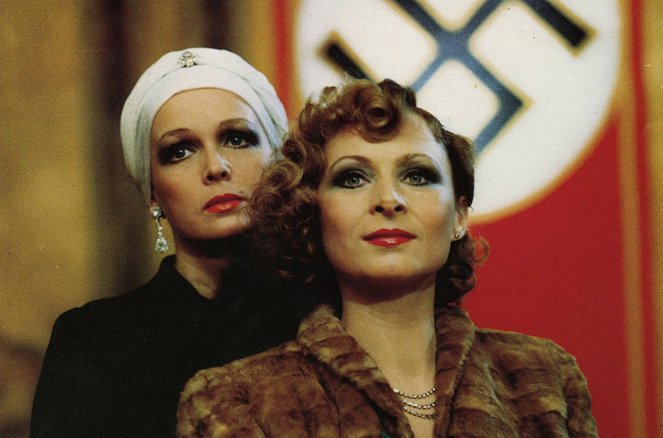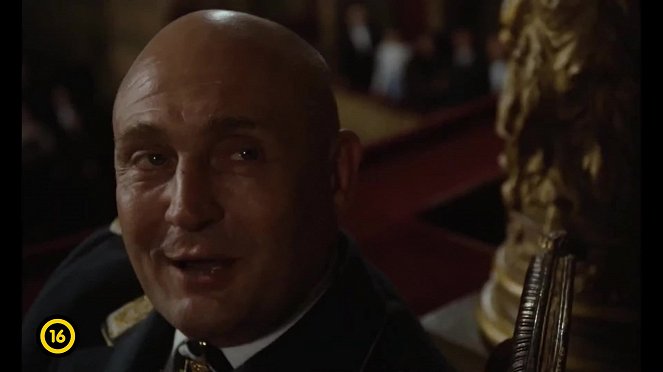Rendező:
István SzabóOperatőr:
Lajos KoltaiSzereplők:
Klaus Maria Brandauer, Krystyna Janda, Ildikó Bánsági, Rolf Hoppe, György Cserhalmi, Péter Andorai, Karin Boyd, Christine Harbort, Tamás Major (több)Tartalmak(1)
A harmincas évek Németországa. Hendrik Höfgen színész mérhetetlen ambícióit nem elégítik ki a hamburgi színházban játszott szerepek. Feleségül veszi a gazdag, befolyásos Barbara Brucknert, Berlinbe szerződik. Végre eljátszhatja élete álmát, a Faust Mephistóját. Az óriási siker után Höfgen minden gondolatát és idejét a színpad köti le, és nem veszi észre, miként köteleződik el egyre inkább a nácik mellett. A karrierjét látszólag jótékonyan egyengető Tábornagy kinevezi a Porosz Állami Színház intendánsává. Felesége eltávozik Németországból, zsidó barátja eltűnik, félvér barátnőjét kiutasítják. Amikor szót emel értük, a Tábornagy durván megleckézteti. Barátai ki akarják menteni őt Németországból, de marad: megbabonázottan lépked egyre feljebb a művészi pálya csúcsai felé. Az életben nem Mephisto, hanem Faust, aki vakon egyezséget köt a Gonosszal. Akkor keríti először hatalmába a félelem, amikor a Tábornagy egy hatalmas stadionban, a nácik készülő új színházában ráirányíttatja a reflektorokat. (Mokép)
(több)Videók (2)
Recenziók (3)
Mirroring Klaus Mann, the son of Thomas Mann, on the theme of Gustaf Gründgens (1899-1963). In the novel and later in the film it is shaped as Hendrik Höfgen's rise through his provincial flirtation with the left in Hamburg, but soon broken with his career growth in Berlin and turned into a bow toward the right. Klaus Maria Brandauer traditionally experiences all the high points of his character to the full extent. As an ambitious actor, he delves into the theatrical atmosphere of the pre-war period, into that unrepeatable world that was so brutally destroyed. This destruction then causes hand-in-hand the rise and fall of many Hendricks, who did not even notice during these few years that the future can only get worse for them. What is by far the most interesting, however, is the depiction of a black German woman in a side story, which is really unusual in films from the interwar period.
()
A unique stylistic experience. Szabó stages the shots in a seemingly conventional way, but their internal dynamics are simply amazing and the narrative moves at a tremendous pace across the very short and intense scenes, even though the intimate framework does not suggest it at first glance. The dialogues are often cut off half-way and composited into the next scene, thanks to which the film forces us to think and constantly hold our attention, which it manages to do throughout, not to mention how incredibly clever and engaging the dialogues themselves are. Also in terms of meaning, the film fully lives up to its legendary reputation by relating to the viewer the horrific immoral machinery of the described era through the ambivalent and continuously changing personality of the lead character, initially bohemian, then naively idealistic and finally completely reprobate, thanks to which it manages to densely erase the gap between "audience and stage" mentioned several times in the script. Although the depressing events I had secretly hoped for did not fully erupt, I still felt a lump in my throat and during the excellent final scene I got a chill... And that’s good :)
()
From the three-part famous series by István Szabó, this is the first and, from my perspective, the strongest film, which also provided Klaus Maria Brandauer with an immensely grateful role of an ambitious actor who became a pawn in a power game. Thanks to the role, he definitively became a big star on the silver screen. While Szabó uses specific historical events and period props, he creates a timeless film about conformity, manipulation, and careerism, which leads to the loss of one's own identity. Szabó's Prime Minister is not a specific historical figure, but an embodiment of the will for power and a person in the highest position of any dictatorship. The very clever screenplay shows the gradual destruction of the personality in numerous details and hints at the path down which the dark initial compromises can lead. Overall impression: 100%.
()
Galéria (24)
Photo © Mafilm



Hirdetés